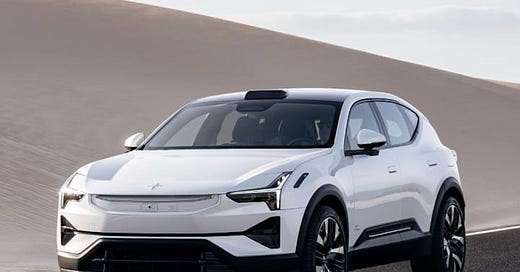Issue 139: Do Electric Cars need Luxury Watch Partners?
Are the age-old bonds between cars and watches being stretched to breaking point by technological differences?
Hello and welcome back to The Fourth Wheel, the weekly watch newsletter that has spent most of the week ‘on location’. Namely Austria, to spend some time with Polestar cars. I’ll be writing about that elsewhere1, but the experience has also prompted some thoughts about the crossover between the worlds automotive and horological, and how that’s changing - or could yet change - in the age of the EV. Read on to hear about how Polestar, and other premium EV makers, could potentially link up with our favourite watch brands.
You will notice this is Issue 139: new readers might not know that every ten issues I do an ‘AMA’, or Ask Me Anything. I’m always excited to see what questions are brewing in your minds - you can quiz me on the fine details of a particular watch or brand, or you can ask me the most wide-reaching, hypothetical or whimsical question you like. Nothing is off the table.
Ask a question by replying to this newsletter, leaving a comment, by sending The Fourth Wheel (or me personally) a DM on Instagram, by joining the Substack chat, or any other means you can find. I aim to answer everyone, but if there are just too many, it’ll be held over for next time. You can find the earlier AMAs here.
The Fourth Wheel is a reader-supported publication with no advertising, sponsorship or commercial partnerships to influence its content. It is made possible by the generous support of its readers: if you think watch journalism could do with a voice that exists outside of the usual media dynamic, please consider taking out a paid subscription. You can start with a free trial!
Here’s a little taste of what you might have missed recently:
Electric Dreams
The Fourth Wheel on four wheels
Three years ago this year, I published an article on the Mr Porter Journal by Ben Oliver. Ben is a terrific, award-winning writer and he has forgotten more about cars than I will ever hope to know. He is extremely eloquent and insightful on the intersection of motoring and technology and the changes the latter is bringing to bear on the former, and finally he also loves watches. I asked him to write something that spoke to all of these areas of expertise, and we headlined it ‘Are EVs And Smartwatches Going To Kill The Link Between Cars And Watches?’
You can, I hope, intuit the starting premise, but Ben summarised it thus:
“Anyone who is drawn to precise, mechanical, gear-y things like cars will probably also like watches, and that affinity has kept the relationship between the two going long after electronic telemetry made mechanical timing obsolete.
…
But electric cars are increasingly digital devices; judged more on their charging speeds or the quality of their user interface (as we would a new phone), rather than the seductive chemistry that a combustion-engined car can create with its driver. An association between an electric car and a wilfully anachronistic mechanical watch just doesn’t seem appropriate.”
While in Austria this week, inevitably the connections between the worlds of watchmaking and motoring came up in conversation. Also, this being a Polestar press trip, so did questions of sustainability, technology, design and so on - as well as some well-oiled discussions on luxury brands in general and what customers are looking for. All of which made me want to revisit some of the topics raised in Ben’s piece, and think again about whether it makes sense for a luxury EV carmaker to have a partnership with a mechanical watch brand.
I’ve broken it down into a list of reasons for and against, before suggesting some pairings that I think might make sense. But it bears dwelling for a second on the two types of EV carmakers. First you have your pure EV start-up brands, like Rivian, Tesla or Rimac. Polestar basically fits in this category, because although its first car was a hybrid, it was made in tiny numbers and the brand is an EV-only brand in every sense today. Then you have the legacy carmakers, which (in the EU and UK at least) have committed to going all-electric by 2035. Some like Rolls-Royce have pledged to be ahead of that target, but others like Volvo and Lotus that once thought this would be doable - or desirable - have backtracked, saying they’ll still have hybrids, at least, in their range in 2030.
More to the point, for my purposes here, most of the established carmakers still have internal combustion engine (ICE) cars at the top of their range - or in the lines that appeal most to their hardcore fans, like Porsche’s GT offering. These brands have very different reasons to partner with watch brands, and tend to focus their marketing tie-ins around their ICE vehicles.
Reasons to do it:
Your customers are quite likely into watches. As a premium-or-above car company - anything from Audi up to Bugatti - your audience skews towards affluent and older individuals. They are more likely to buy luxury watches, which means in theory at least, you have something to gain from talking to them about one of their passions.
It solidifies your positioning as a luxury brand. This matters most to the newer car companies, obviously. Everyone knows Rolls-Royce is a luxury brand, and its debatable to what extent associating with any other company is necessary for them. But for a company in Polestar’s shoes, there might be benefits to being mentioned alongside a really established name that’s suitably expensive and exclusive.
It could help convert sceptics. I think this is the most variable of the three, but I can see a scenario in which subliminally, this might sway a few people off the fence towards an EV. Overtly, it’s the kind of reasoning anyone would reject - who buys a car because of its marketing partnerships? - but the subconscious processes behind our perception of ‘good taste’ and the things we decide to spend money on are more complex. Who’s to say that a close relationship with your favourite watch brand wouldn’t influence your chance of buying a certain car?
Reasons not to do it:
Younger customers aren’t interested. Your existing customers might be 45+ men with a few Panerais or Pateks in the drawer, but nobody ever got anywhere by just talking to their existing market. Despite what any Swiss CEO says, watch brands are not selling thousands of watches to younger millennials and Gen-Zers. If you’re a car company of the future, why would you associate yourself with an industry that is having a hard time getting through to that demographic?
Keep reading with a 7-day free trial
Subscribe to The Fourth Wheel to keep reading this post and get 7 days of free access to the full post archives.








